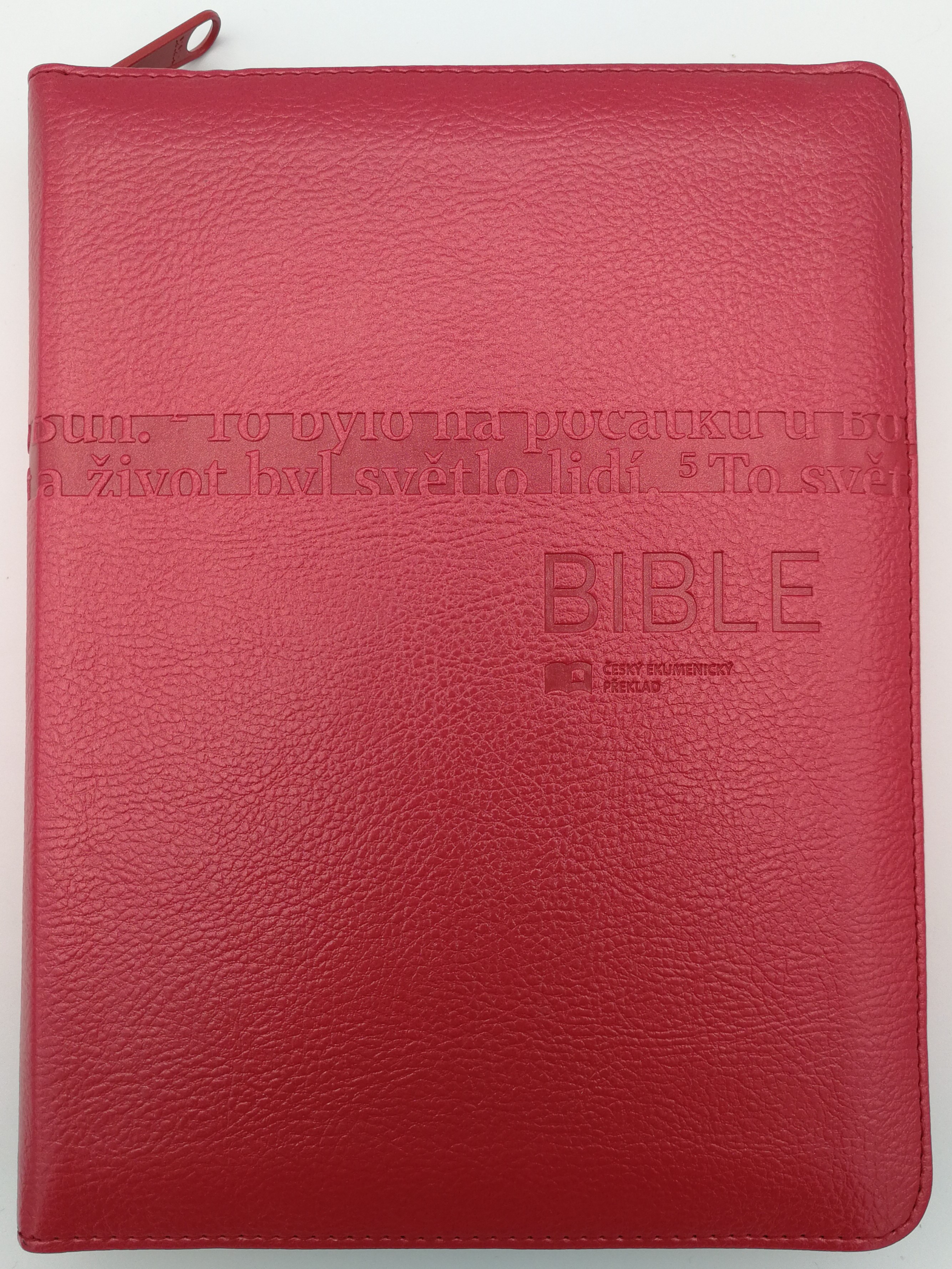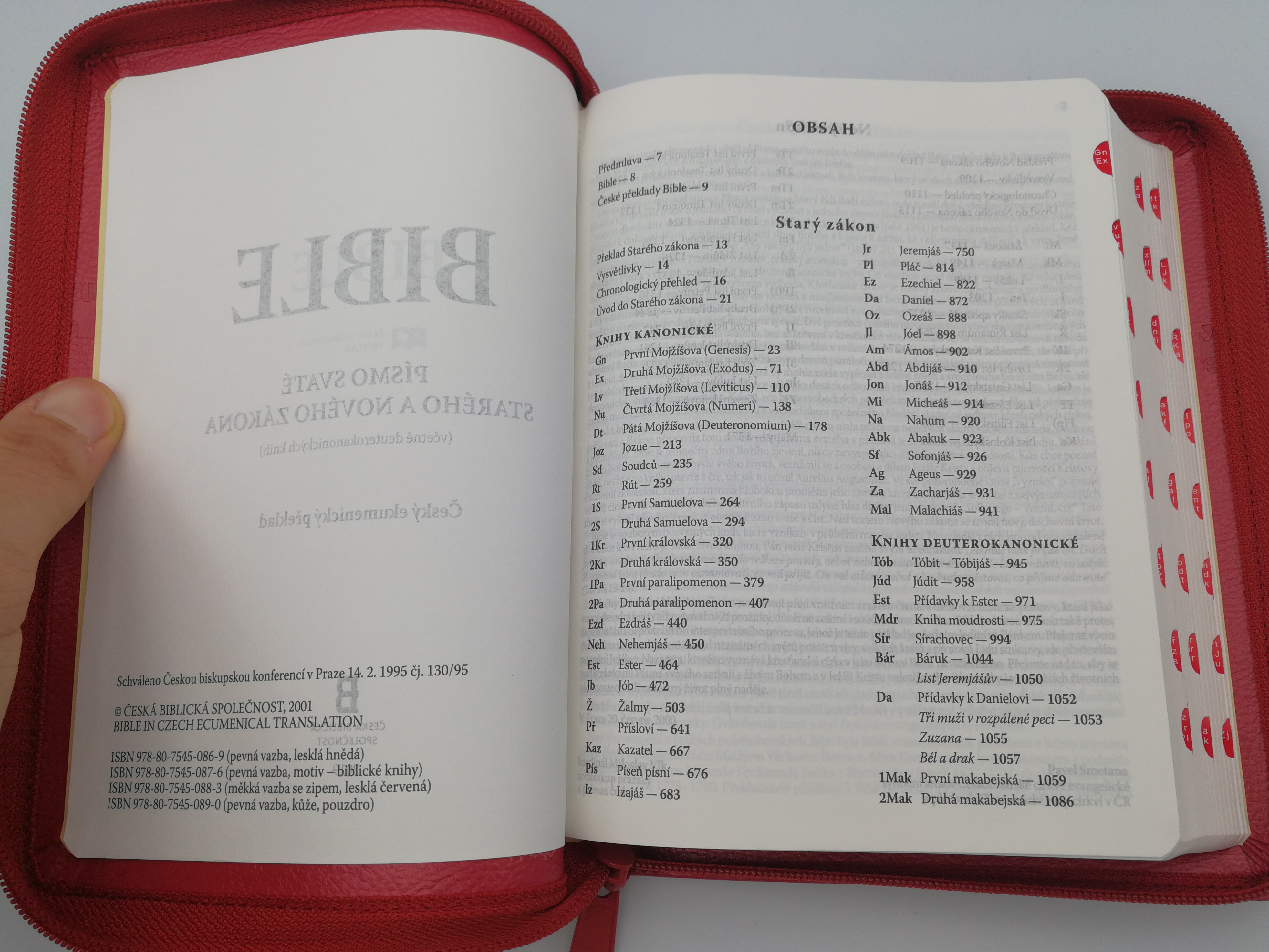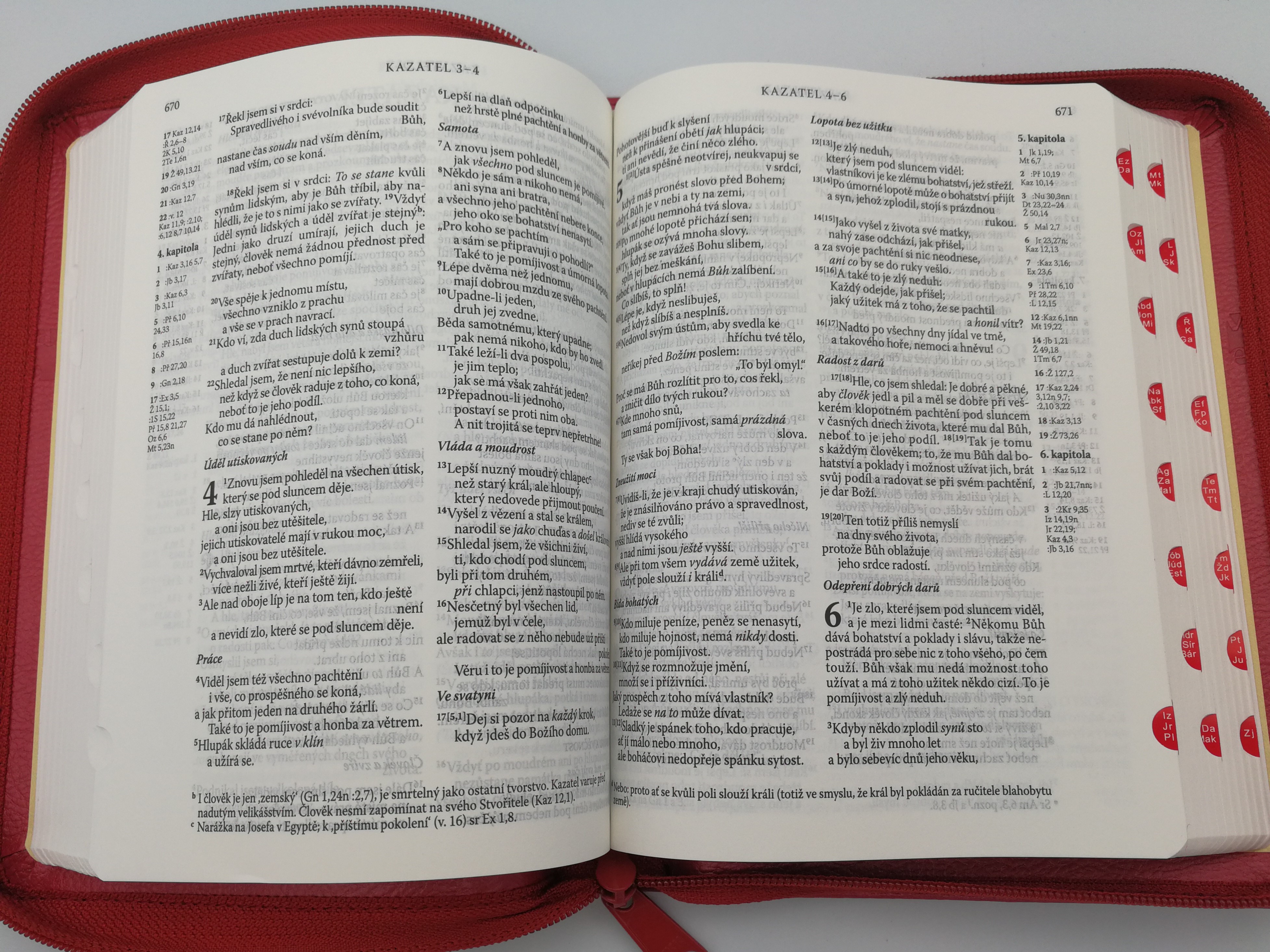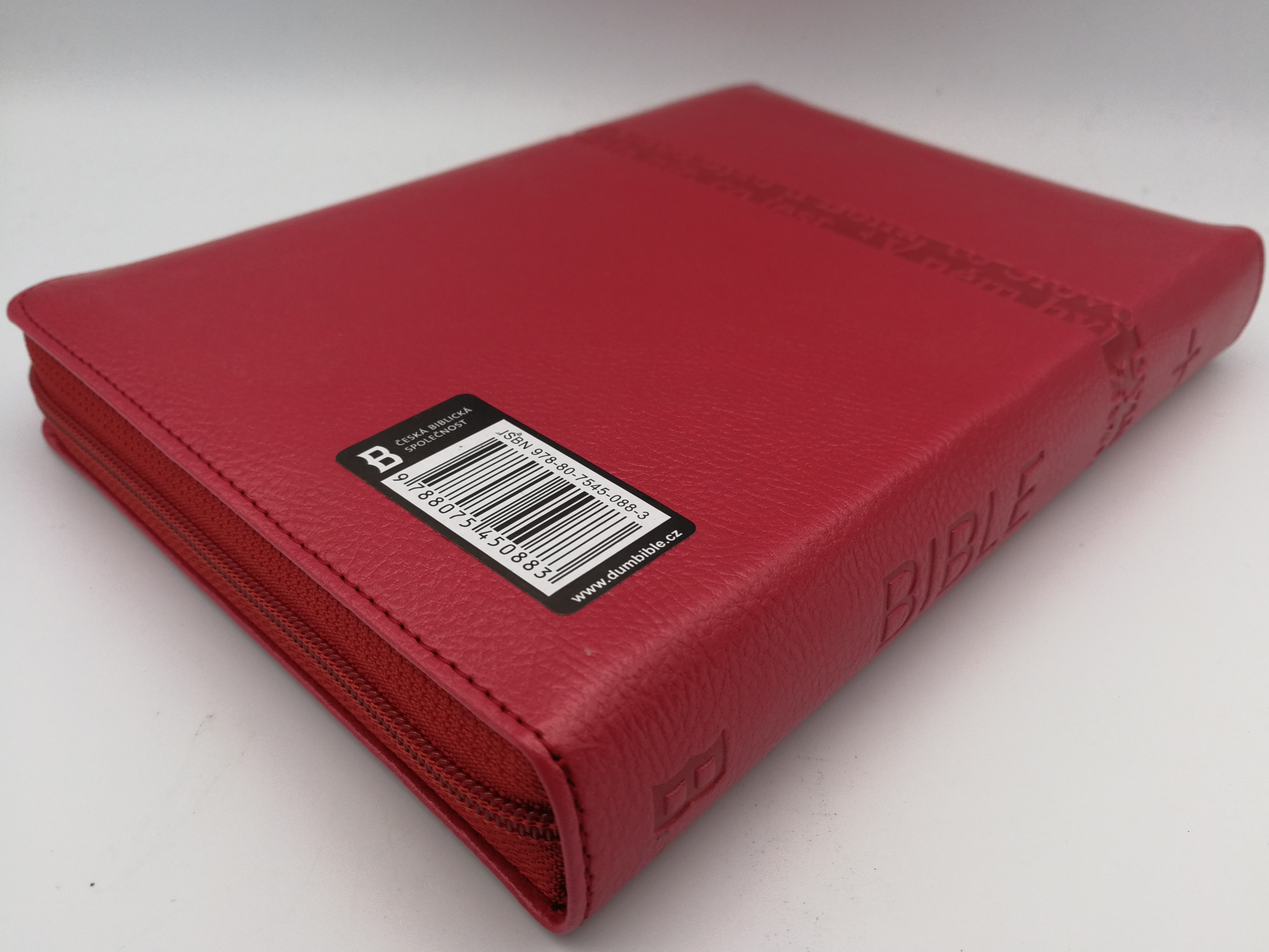Description
Leather Bound Czech Bible - Ecumenical translation
Red with zipper & thumb index / Pismo Svaté Starého a Nového Zakona / Český Ekumenický překlad / Česká biblicka společnost 2019 / With Deuterocanonical books
- Leather Bound 2019
- ISBN: 9788075450883 / 978-8075450883
- ISBN-10: 8075450884
- PAGES: 1392
- PUBLISHER: Česká biblicka společnost / Czech Bible Society
- LANGUAGE: Czech / Čeština
- Dimensions: 175×135×30 mm
English Summary:
Czech language Bible, with Red Leather binding, Thumb index. With 17 maps. Includes Apocrypha - Deuterocanonical books. Chronological tables, Cross references of verses on the margins.
The practical cover with a zipper will be appreciated by everyone who carries the Bible in a purse, bag, briefcase or backpack.
This edition includes not only all previous revisions of the text, but also a new, clearer graphic arrangement, easy to read in various formats.
The main text of the new edition is in two columns, the notes at the bottom below the text and the references in the outer margins of the page. New, clearer maps are also added.
This edition also includes orientation cut-outs that allow quick searching of individual books.
The Czech Ecumenical Translation, ČEP (often called just the Ecumenical Translation), is a modern Czech translation of the Bible, made in the years 1961–1979 and recognized by all Czech Christian churches.
The idea of a joint interdenominational Czech translation of the Bible began to emerge already during the Second World War. The actual translation was started in 1961 under the leadership and at the initiative of the Evangelical Faculty of Theology professors Miloš Bič (Old Testament group) and J.B. Souček (New Testament group). The translation involved two teams of experts who also collaborated with consultants from the United Bible Societies. The ecumenical translation gained ground very quickly; the Catholic Church recommended it for use through Cardinal Tomášek in 1985.
In 1970, the first part of the translation, the book of Genesis, was published. In 1973 the four Gospels, in 1975 the Psalms, in 1978 the second part of the New Testament and in 1979 finally the entire Bible. It is published in a double version - including the deuterocanonical books (according to the Catholic and Orthodox canon) and without them.
This translation is an initiative of the Protestant Churches, however, it is recognized and used by all Christian denominations including Orthodoxy and the Roman Catholic Church, which was also its purpose. The text is taken directly from the original languages (Hebrew, Aramaic, Greek) into modern, comprehensible Czech, while preserving the biblical diction and style.
The Czech ecumenical translation seems to be the most cited in modern literature, next to the King's Bible it is one of the most widespread and is also considered a standard source of biblical citations.
Copyright to the translation belongs to the Czech Bible Society.
Czech Summary:
Praktický obal se zipem ocení každý, kdo nosí Bibli v kabelce, tašce, kufříku nebo batohu.
Toto vydání zahrnuje nejen veškeré dosavadní revize textu, ale také novou přehlednější grafickou úpravu, dobře čitelnou v různých formátech.
Hlavní text nového vydání je ve dvou sloupcích, poznámky dole pod textem a odkazy na vnějších okrajích stránky. Připojeny jsou i nové přehlednější mapy.
Součástí tohoto vydání jsou také orientační výřezy, které umožňují rychlé vyhledávání jednotlivých knih.
Český ekumenický překlad, ČEP (často nazýván pouze ekumenický překlad), je moderní český překlad Bible, pořízený v letech 1961–1979 a uznávaný všemi českými křesťanskými církvemi.
Myšlenka společného mezikonfesního českého překladu Bible začala vznikat již za 2. světové války. Vlastní překlad byl zahájen v roce 1961 pod vedením a z iniciativy profesorů Evangelické teologické fakulty UK Miloše Biče (starozákonní skupina) a J. B. Součka (novozákonní skupina). Na překladu se podílely dva týmy odborníků, kteří spolupracovali i s konzultanty ze Spojených biblických společností. Ekumenický překlad se prosadil velmi rychle; katolická církev jej doporučila k užívání prostřednictvím kardinála Tomáška v roce 1985.
V roce 1970 byla publikována první část překladu, kniha Genesis. V roce 1973 čtyři evangelia, v roce 1975 žalmy, v roce 1978 druhá část Nového zákona a v roce 1979 konečně celá Bible. Vychází ve dvojí verzi - včetně deuterokanonických knih (podle katolického a pravoslavného kánonu) a bez nich.
Tento překlad vychází z iniciativy protestantských církví, nicméně je uznáván a používán všemi křesťanskými denominacemi včetně pravoslaví a římskokatolické církve, což bylo také jeho účelem. Text je pořízen přímo z originálních jazyků (hebrejština, aramejština, řečtina) do moderní, srozumitelné češtiny, přičemž zachovává biblickou dikci a styl.
Český ekumenický překlad je, zdá se, nejcitovanější v moderní literatuře, vedle Bible kralické patří k nejrozšířenějším a platí také za standardní zdroj biblických citací.
Autorská práva k překladu vlastní Česká biblická společnost.








































